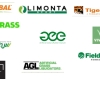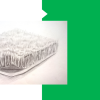When identifying and assessing artificial grass factories in China
consider the following steps to ensure you're dealing with reliable manufacturers:
1. Raw Material Differentiation
Types of Materials:
C4 and C6 Polyethylene (PE): Standard raw materials from Sinopec or PetroChina, commonly used in most factories for affordability and decent quality.
C8 Polyethylene (PE): Premium material from Dow Chemical, offering superior durability,UV resistance, and a natural feel. Used by a few high-quality manufacturers, mostly in Jiangsu Province.
Second-Hand Materials: Some factories, especially in Hebei, use recycled materials, resulting in poor quality, short warranties (3-6 months), and turf that degrades quickly.
How to Identify:
Ask about the source of raw materials.
Request certifications and test reports.
Be wary of overly cheap prices.
Good Examples: Geegrass: Uses high-quality PE and offers recyclable turf solutions.
2. Capability to Produce Professional Sports Turf
Key Sports:
Basic sports like football can be produced by most factories.
Professional-grade turf for tennis, hockey, rugby, and putting greens requires
specialized knowledge and adherence to international standards (e.g., ITF, FIH, FIFA).
Export-Oriented Factories: Understand global requirements and can produce both basic and professional sports turf.
Domestic-Focused Factories: Focus on the local market with limited expertise in international standards, unsuitable for professional-level turf.
Notable Producers:
CCGrass: World leader in synthetic turf with extensive capabilities.
Suntex: Known for ITF-certified tennis turf and exceptional putting greens.
Geegrass: Emerging with innovative solutions and recyclable materials.
3. Location-Based Differentiation
Jiangsu Province:
Strengths: Largest production hub with eco-friendly and high-tech factories.
Key Players: CCGrass, Suntex, Taishan, VIVA and Geegrass
Product Range: From middle-class to high-end artificial grass.
Guangdong Province:
Few manufacturers but strong export activities due to proximity to shipping networks.
Hebei Province:
Strengths: Budget-focused factories with the lowest prices.
Weaknesses: Often use second-hand materials and inferior backing glue.
4. Grass Yarn Production
Raw Material Manufacturers:
Specialize in making high-quality yarn, often supplying other turf manufacturers.
Full-Service Manufacturers:
Handle both yarn production and turf manufacturing, offering better quality control and cost efficiency.
Advantages:
Better technology and expertise in yarn production.
Lower costs and improved consistency for full-service factories.
How to Choose:
Verify if the factory produces its yarn or outsources it.
Check for production capabilities and experience in yarn technology.
5. Tips for Choosing the Right Factory
Define Your Needs:
Budget turf: Consider Hebei.
Mid-range to high-quality turf: Choose Jiangsu-based factories.
Professional sports turf: Focus on export-oriented factories like CCGrass and Geegrass
Ask for Samples:
Evaluate raw material quality, backing, and UV resistance.
Inspect Certifications:
Ensure compliance with safety and performance standards (e.g., FIFA, ITF).
Conclusion:
China has a diverse range of artificial grass manufacturers catering to different needs, from budget to premium turf.
By understanding their raw materials,sports turf capabilities, locations, and production models,
you can select the factory that best suits your requirements. Would you like further assistance in finding or contacting a specific factory?





